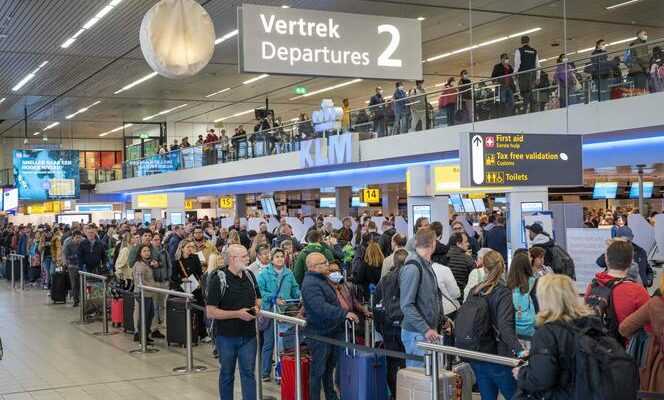The massive holiday departures of the Dutch this season and the consequences of the health crisis due to Covid-19, which led to the equally massive elimination of workstations: nothing more was needed to create a completely chaos at Amsterdam Airport Schiphol. Over the past few days, travelers have been asked to arrive four hours before take-off and huge queues have formed at the airport gates over the weekend of April 30 and 1er may. Firefighters sometimes had to intervene to distribute water and, ultimately, the director of operations had to call for the cancellation of flights.
The national company KLM, associated with Air France, had to cancel more than 70, and part of its traffic was diverted to Rotterdam. A tile for the company, which was experiencing a spectacular recovery thanks to the strong resumption of movements, and which brought together its shareholders on Monday May 2, in particular to confirm the appointment of Marjan Rintel, ex-president of the Dutch railways (NS) , as CEO. She succeeds Pieter Elbers.
For the management of Schiphol, it was a question, during the weekend, of ensuring “the safety of passengers and staff”, she argued. She was actually unable to cope with an influx of travelers yet predictable given a crying lack of security guards and baggage handlers. It would miss 500 out of a total of 5,000 in this hub among the most important in Europe which, in 2019, before the pandemic, had registered some 70 million passengers. During this week of school holidays in the Netherlands, 174,000 were expected per day.
“French Strike”
A high rate of absenteeism and the difficulty in finding replacements for the many members of staff who left the company during the health crisis explain a situation that is no longer exceptional. London’s Heathrow airport was faced with similar problems a few weeks ago, and that of Brussels-Zaventem launched a recruitment operation for 1,200 employees, which is coming up against the traditional low wages in this sector, as well as the need for candidates to accept very flexible working hours.
The absence, in the Netherlands, of a partial unemployment system has also accelerated the departure of employees during the pandemic. And those who stayed describe working conditions that have become impossible. They triggered, Friday, April 23, what the daily NRC was calling “a French strike”. A “wild” movement, not organized by the unions, which is exceptional in the social history of the kingdom. In a few hours, 150 baggage handlers managed to block all activity, which had led to a first wave of flight cancellations: around a hundred for KLM, around forty for other companies. The police had finally had to cut off the road access leading to the airport.
You have 43.69% of this article left to read. The following is for subscribers only.
